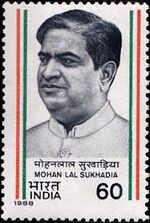Mohan Lal Sukhadia

Mohan Lal Sukhadia (31 July 1916 – 2 February 1982) was a politician from Rajasthan, who served as the Chief Minister of Rajasthan for 17 years (1954–1971). He became chief minister at age 38 and was responsible for bringing major reforms and developments in Rajasthan. For this, he is still widely revered as the "founder of modern Rajasthan".
Early Life
Mohan Lal Sukhadia was born in a Jain family of Jhalawar. His father, Purshottam Lal Sukhadia, was a well known cricketer of the Bombay and Saurashtra teams.
After completing primary education in Nathdwara and Udaipur, Sukhadia went to Mumbai for a diploma in electrical engineering. There, he was elected General Secretary of the student body. Mr. Berley, the British principal of the college, wanted to invite governor of Bombay in a college ceremony. Sukhadia, along with other students, vehemently opposed the idea and asserted to invite then Chief Minister of Bombay B. G. Kher instead. Finally, college authorities had to bow down against the demands of students. Sukhadia had successfully led his first revolt against British Rule exemplifying his uncanny leadership abilities and managerial skills.
Later in his career, Sukhadia also served as the Governor of Karnataka, Andhra Pradesh and Tamil Nadu.
Career in Politics
After Independence of India in 1947, on 30 March 1949, Heera Lal Shastri formed the cabinet to become first Chief Minister of Rajasthan. After Heera Lal Shasrti resigned from the post on 26 March 1951, Jai Narayan Vyas took over his post. Sukhadia was appointed as minister in the newly created cabinet.
First state Legislative elections of Rajasthan were held in 1952. Tika Ram Paliwal became Chief Minister on 3 March 1952 for a brief period of time. Jai Narayan Vyas replaced him on 1 November 1952. Sukhadia handled Revenue, Irrigation, Agriculture and other significant portfolios during this period.
After elections in 1952, 22 members of Ram Rajya Parishad joined Congress Party on persuasion of Jai Narayan Vyas. However, congress workers objected to his decision as most of the Ram Rajya Parishad members were former zamindars and believed this would affect ongoing land reforms in the state. Amidst growing resentment against Jai Narayan Vyas, Congress High command directed him to seek Vote of Confidence of Congress legislative members.
Veteran Jai Narayan Vyas was directly pitched against the 38-year-old Revenue Minister of his own cabinet, Mohan Lal Sukhadia. First time in history of democratic India, two people were openly contesting for post of Chief Minister. Sukhadia defeated him by 8 votes to become youngest Chief Minister of India. He continued on this post for record making 17 years(13 Nov 1954 – 8 July 1971). His record of longest-serving Chief Minister in Indian political history was untouched until Jyoti Basu surpassed it in 1994.[1]
Development of Rajasthan under Sukhadia
Sukhadia Era in Rajasthan witnessed a dramatic reversal of the colonial policy of almost complete neglect of the education and health sectors. Sukhadia government’s commitment to the social sector is brought out by the fact that despite facing a very precarious budgetary situation, it steadily increased its expenditure on social service. One of the clearest signals of this was decision of Sukhadia to retain the Education portfolio even after becoming the Chief Minister of the state.
Results were evident by the end of 1970. Rajasthan’s outlays on health and education were significantly higher than all other North-Central Indian states and all-India average. By 1969, Rajasthan’s education spending as a proportion of total SDP (3.2%) was double that of UP (1.5%). Similarly, in the health sector, Rajasthan’s expenditure grew to Rs.8.23 per capita in 1970–71 whereas UP spent only Rs.3.2.
Demise
Mohan Lal Sukhadia breathed his last in Bikaner on 2 February 1982.

